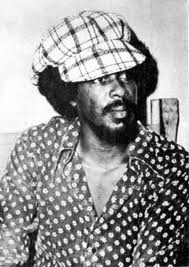
Humility can become an even scarcer commodity among those who have achieved greatness. While the statement holds true in many instances, it does not apply to the great Jamaican songwriter and music icon, Bob Andy.
After years of unending showers of praise about his songwriting ability, and his humility in never openly accepting it, Andy seems to have, in later years, finally decided that his work deserves the recognition it has been given.
“I must really start accepting the credit these people are giving me for writing because a lot of times I am so modest, I say if I was a good carpenter, I would make good tables and chairs. But I really set out to craft these songs because they were going to represent me for life. What people call depression, when I go down there, I come up with a song,” Andy told me in a 2005 interview for radio.
Zero-tolerance approach
Throughout his entire career, Keith Anderson has been well known, not only for his songwriting, but for his zero-tolerance approach to injustice, which he preaches in his recordings and demonstrates in real life.
Perhaps there is no other recording where the fight against injustice is more pronounced than in the self-produced, mid-1970s recording,Check It Out.
In it, Andy mercilessly chastises the establishment, while putting his songwriting skills on display:

Multinationals are really
criminals, all forms of
gambling
there’s no way you can win.
Open your eyes
It’s time you realise
that the rise in the price is to
make more money for who’s
got plenty
and the trick of the trade is to
keep all the hungry bellies
empty.
Come see these legal crooks,
who learn their tricks by the
books.
So-called disciples of God
who rule with an iron rod.
Fire Burning, a 1974 Bob Andy-penned, Lloyd Charmers-produced recording, played host to perhaps his most enduring message.
The lyrics were so ‘hot’ that owner of Federal Records, Richard Khouri, was hesitant in putting it out. It, however, defied the odds and went straight to No.1 that year.
In the recording, Andy highlights the sad imbalances that exist in Jamaica’s social structure. Drawing on his powers of introspection, Andy declared:
I was drawn into myself,
observing all this time,
from every angle, I can see
my people, you’re meeting hell.
Brothers have turned to crime
so they die from time to time.
I’d like to ask you leaders,
what have you got in mind?
Uncontrollable fire
Andy said that although the Government had instituted some effective changes, he was unhappy with the slow pace at which things were moving, and with crime and violence on the rise, he envisioned an uncontrollable fire:
I can see the fire burning, it’s
getting hotter and hot,
and the haves will want to be
in the shoes of the have-nots.
The fire spread as far as Jamaica House, and Andy was summoned there by Prime Minister Michael Manley to help cool the flames. In a dramatic scene at Jamaica House, Manley tried to get Andy to back off, but he (Andy) diplomatically stood his ground.
Although Andy penned several sentimental love songs, his revolutionary songs stood out. His humility, wit, and revolutionary stance could be felt as far back as his Studio One days when he had cuts like Let Them Say, Life Could Be A Symphony, and Unchained, which gave full expression to the freedom he was searching for, being a runaway child:
Just take these chains away
and set me free
Remove me out of bondage
and we’ll agree.
Too long I’ve been a slave, I
want to be no more
I’d rather dig my grave than
be locked behind the door.
He speaks eloquently in My Time about the experience he has gained in a lonely life filled with disappointments:
Experience has taught me
wisdom
Thank God I’ve got
some life left
I’m getting out of serfdom, my
soul had stood the test.
I need nothing to be a man,
cause I was born a man,
and I deserve the right to live
like any other man.
Andy again placed his humility on display as he responded to a question concerning awards during that 2005 radio interview:
“I kinda like to say that I get my honor from the people of Jamaica. The people recognise me from the start, and them acknowledge me from then until now. I don’t really want no honor from Government. Me is 60 now, so if they had given me earlier, then me could say, ‘Well, me could enjoy that’ but me coulda dead between then and now.”
Bob Andy received the Order of Distinction (Commander class) from the Jamaican Government in 2006.
Some people call him ‘The man with the golden pen’, and his reputation has even spread abroad.
Greatest Writer
Chris May, writing in Black Music magazine, referred to Andy as the greatest living songwriter in Jamaican music, Steve Barrow called him, “Jamaica’s best writer”, while Ian McCann, writing in Tower Records’Top Magazine, says, “Bob Andy remains one of the best songwriters in the world.”
Check Marcia Griffiths’ big hits – Fire Burning, Really Together, Truly,Mark My Word, Melody Life, Tell Me Now – all written by Andy.
The same can be done for Delroy Wilson who hit with Impossible, Ken Boothe’s I Don’t Want To See You Cry, and many more.
The number of artists that have covered Andy’s songs runs like an unending roll call: Sun Shines For Me (Gregory Isaacs), Unchained(Sanchez), It’s Impossible (Dennis Brown), I Don’t Want To See You Cry (Horace Andy), Truly (Pam Hall), Feeling Soul (Wayne Wonder and Ruddy Thomas), Too Experienced (Winston Francis and Barrington Levy).
The count continues with more than 40 other artists, including Little John, Barry Biggs, King Sounds, Myrna Hague, B.B. Seaton, and Leroy Smart.
Bob Andy began his recording career with the sound-system-played, unreleased recording, I’m In Love, in duet with Tyrone Evans for producer Duke Reid.
broyal_2008@yahoo.com




